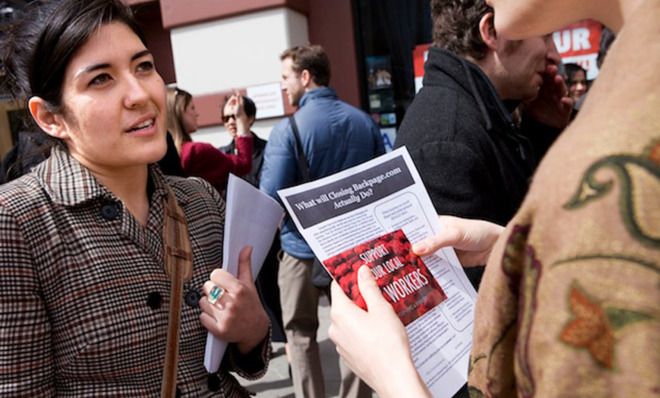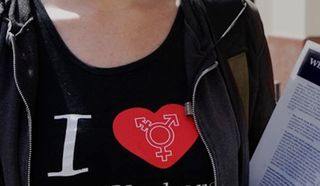Revamping the sex trade
Through business consultancies, political rallies, and poetry readings, sex workers of all stripes have stepped out of the shadows


"When I got raped," Jodi S. Doff says plainly, as if talking about a mild bout of stomach flu, "I went to work that afternoon. I'd been kept in the house for six hours and raped and tortured and I just called in late."
Friends and colleagues of Doff's had been murdered, kidnapped, beaten, slapped, spit on. This was early '80s New York, and these were strippers, "hoochy-coochy gals," as Doff calls her former self, working the poles at places like Robbie's Mardi Gras and the Lollipop.
"Really," she remembers, "you looked at it like it was part of the package: You play with snakes, you're gonna get bit."
Subscribe to The Week
Escape your echo chamber. Get the facts behind the news, plus analysis from multiple perspectives.

Sign up for The Week's Free Newsletters
From our morning news briefing to a weekly Good News Newsletter, get the best of The Week delivered directly to your inbox.
From our morning news briefing to a weekly Good News Newsletter, get the best of The Week delivered directly to your inbox.
Doff's rapist, a pimp who hung out in the club she worked in at the time, came in for a drink hours after he attacked her. She was battered and bruised, he was clinking a cup of ice and liquor. Doff's bosses simply shrugged, ultimately kicking the guy out of the bar at Doff's insistence, but welcoming him back two weeks later.
Doff knows now that she needed an exit, but she saw none.
"Had there been some place to go, or someone to talk to, or outreach done, I think it would've been a point that I would've been ready to hear it," she says. "But I did not leave at that point. I did not clean up my act."
Doff counted several friends among the strippers she worked with, but the camaraderie of the job extended only so far beyond the mirrored walls and the besuited men of Midtown. So she continued stripping.
Sign up for Today's Best Articles in your inbox
A free daily email with the biggest news stories of the day – and the best features from TheWeek.com
"Looking back with sober eyes," she says of the superficiality of the job, of the self-preservation that it forced upon young women like herself, "it was the kind of community you make, and the friendships you make, when you're in a war zone."
(More from Narratively: The wondrous lives of Julius Shapiro)
On a stunning spring afternoon, the scene on a small hill in the middle of Central Park seems plucked from a snow globe purchased in a tacky tourist shop, except with Frisbees, baseballs, and kites instead of floating flecks of white. Near a tall oak there's a gaggle of tiny children laughing and playing tag — right over there, near the sex workers.
There are about 20 of them — escorts, dominatrices, call boys, rent boys, strippers, burlesque dancers, porn actors, fetish workers, sensual masseuses and their allies — lounging on blankets amid paper bags of bagels and cream cheese and boxes of miniature cupcakes. There's even a rabbit on a leash, sniffing about the stacks of intertwined legs. The gathering looks downright normal, aside from the rather chubby bunny in their midst — just a group of sex industry pros doing what they, too, sometimes do on weekends in spring — picnicking.
In the crowd is a 29-year-old woman named Sarah Jenny Bleviss. Heavy-set, brown-haired and baby-faced, Bleviss is fond of altering her T-shirts with scissors so that they reveal a few fleshy inches of cleavage — which inevitably calls even greater attention to the sex-worker advocacy slogans splashed across her chest.

Bleviss is a co-founder of the New York chapter of the Sex Workers Outreach Project, a national grassroots organization founded in 2003 that is dedicated to improving the lives of those in the sex industry. SWOP-NYC, which formed in '07, has taken its pro-sex-worker and anti-trafficking advocacy from the State Capitol in Albany to Village Voice Media in Manhattan, where members picketed for the salvation of Backpage.com, the intensely controversial adult services website. (Thought by critics to be a haven for human traffickers, SWOP argues that in the absence of sites like Backpage, predators would be pushed even further, and more undetected, into the fringes of society; Village Voice Media recently announced a split-off from the company that owns Backpage.)
(More from Narratively: The 93-year-old who won't stop tinkering)
Doff, now an eccentric 55-year-old with a gray bird's nest of thick, curly hair — who, by the way, says her official middle "initial" is actually "Sh." — sometimes refers to this new breed of activist as the "intellectual sex worker."
Perhaps more so than the rallies, it's the monthly support groups and workshops run by SWOP and SWANK — and the Central Park picnics, beach outings, and stoop sales — that provide the sense of empathy, protection and community that Doff was missing that awful night 30 years ago.
"Most sex workers are extremely isolated and do not know other sex workers," Sarah Elspeth Patterson, a community organizer for SWOP-NYC, explained in her Brooklyn apartment last spring. "And so this is really an opportunity for them to feel that there's a space that's safe."
SWOP workshops have titles like "Tantra 101: A Practitioner's Skill-Share" and "How to Date as a Sex Worker." But these meetings, and political outings, are just one aspect of a burgeoning movement that is drawing sex workers in New York and elsewhere out of the shadows, where they've been marginalized for millennia. From sex worker luncheons offering legal services, to literary readings and even a business consultancy providing web design and workflow advice, the city's sex workers continue to expand their public presence, humanizing an industry that is frequently cast in gloom and doubt.

Of course, these self-described sex worker activists insist they have actively chosen the lives they lead, and many say they're proud of their profession — a vital distinction from those forced into prostitution against their will.
The sex worker activist is not without his and her foes, though. Their work, after all, is a bit murky, legally and ethically speaking. Is this promotion of prostitution that they champion, the green-lighting of a lifestyle that seems to extend a welcome mat to sexual predators? Or is it merely the protection of a vulnerable class that will continue working, even in the shadows?
At a Backpage rally outside Village Voice Media in June, several dozen members of the Coalition Against the Trafficking in Women chanted their opposition to sex work:
"Village Voice, change your career, no more selling women here!"
(More from Narratively: The great scientific snub)
Meanwhile, a handful of SWOP and SWANK members — the "counter-protest" — stood silently in the wings, scoffing at the opposition's signs, which said things like, "Real Men Don't Buy Sex," and "Prostitution is the World's Oldest Oppression."
More often than not, however, the sex worker activists' embrace of the right to work in this industry is loud and clear, if often provocatively dressed and peppered with x-rated proclamations.
At the gay pride parade in June, one SWOP/SWANK member strutted down lower 5th Avenue in a red dress that fit like a fingerless glove, holding a sign adorned with the widely recognized acronym J.A.P. Except, this woman spelled out the words a bit differently, announcing with a smile and a wag of her tongue that she was "Proud to be a JEWISH AMERICAN PROSTITUTE."
"It's a small but growing movement," Bleviss, the SWOP-NYC co-founder, explains of sex-worker advocacy, or "anti-oppression work," as she calls it.
"It's a broad social, economic and racial goal," she says.
Read the rest of this story at Narratively.
Narratively is an online magazine devoted to original, in-depth and untold stories. Each week, Narratively explores a different theme and publishes just one story a day. It was one of TIME's 50 Best Websites of 2013.
-
 Bombs or talks: What’s next in the US-Iran showdown?
Bombs or talks: What’s next in the US-Iran showdown?Talking Points US gives Tehran a two month deadline to deal
By Joel Mathis, The Week US Published
-
 Inside the contested birth years of generations
Inside the contested birth years of generationsThe Explainer Battles over where Gen Z ends and Gens Alpha and Beta begin remain unsettled
By David Faris Published
-
 Art review: Jack Whitten: The Messenger
Art review: Jack Whitten: The MessengerFeature Museum of Modern Art, New York City, through Aug. 2
By The Week US Published